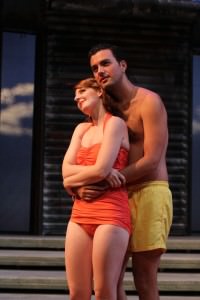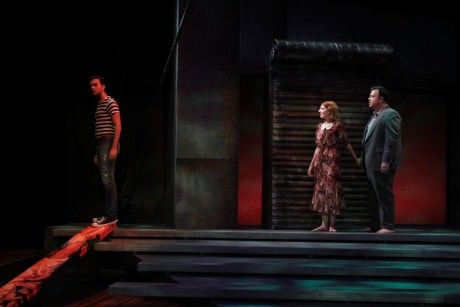Eurydice, Sarah Ruhl’s fresh take on a classic Greek myth, is irreverent and deadly serious at the same time. It’s profound… and at times it’s also profoundly silly. And its willingness to jump between these tones, while never losing sight of its eternal and relevant themes, makes it captivating. While Villanova Theatre’s production doesn’t quite dig into all of its themes as deeply as it could, it’s still a stirring experience.

In Eurydice, Ruhl takes on the tale of the musician Orpheus, so overcome by grief over the death of his bride Eurydice that he follows her into the underworld to take her back to the land of the living. Ruhl shifts the story’s focus to Eurydice and gives the character depth and complexity. The play focuses on Eurydice’s relationship with a new character: her deceased father, who lives in the underworld and writes wistful letters to her that he’s certain she’ll never get to read. Learning of her upcoming wedding, he mimes walking her down the aisle, beaming with pride as he imagines her on his arm.
When Eurydice dies on her wedding day and arrives in the underworld, she’s robbed of her memories by the waters of the river Lethe – represented here by a striking image of a rain-filled room she exits via a storefront roll-down metal door. Her father, whom she does not recognize, patiently takes it upon himself to rebuild her mind, reintroducing her to the things she once loved, like language, books, music… and memories of her husband. It’s then that Orpheus’ own grief compels him to reunite with her, an action that prompts a second misfortune in a play that has more than its share of tragedy.
By expanding the story beyond the two lovers, Ruhl successfully explores themes of love, death and memory in a way that is acutely resonant. While Eurydice is deeply in love with her husband, her relationship with her father turns out to be the most important in her life. And Kevin Esmond’s lovely performance brims with compassion, showing this father’s resolve as he father puts his daughter’s needs ahead of his own.
But part of the reason that Esmond comes across so well is that the other main characters in Director James Ijames’ production don’t make as big an impact. As Eurydice and Orpheus, Rebecca Jane Cureton and Stephen Matthew Tornetta make a cute couple – their frolic in bathing suits during the opening scene is definitely worth paying attention to – but they don’t really make a strong connection. We’re repeatedly told that Orpheus is a great musician, but we only briefly see him play an instrument, and a song that he has supposedly written for his wife (and which he hums repeatedly) sounds an awful lot like one of Irving Berlin’s biggest hits. That makes Orpheus seem ineffectual. Later, as Orpheus mourns his wife, Tornetta sticks to one emotion – monotone misery – which gets repetitive. Both at this point and in the early scenes, Tornetta seems detached from the story.
Cureton fares much better – she’s charming in her carefree opening scenes and poignantly bewildered when she first reaches the underworld – but she never quite achieves the expressive release that her character needs. Part of that may be Ruhl’s fault, as Eurydice loses not only her memories but her emotions when she enters the underworld; this leaves the performer with little room to let go. “What happiness it would be to cry,” Eurydice says at one point – and it’s a “happiness” that the production could use more of.
Chris Monaco scores with mischievous takes on a couple of outlandish comic roles, and a Greek chorus of “stones” (Rachel O’Hanlon-Rodriguez, Elizabeth Meisenzahl, and Megan Rose) has some bizarre interactions with Eurydice and her father. The stones warn that life in the underworld is easier if you don’t make an effort to remember the past; Ruhl reminds us that the pain of remembering is worth the effort.

Ruhl’s creative take on mythology is matched by the creativity of the design team. Set Designer Parris Bradley playfully offers planks for the actors to scamper across and wires for them to dodge, set against a harsh industrial background. Jerold R. Forsyth’s lighting covers the underworld with shadows that shimmer across the stage, and Janus Stefanowicz’s costumes mix practicality for the supporting characters with touches of glamour for the leading couple.
Eurydice is a moving modern meditation on love, loss and remembrance. It’s an inspiring work with moments of wonderment that make it worthwhile.
Running Time: 90 minutes, with no intermission.
Eurydice plays through October 4, 2015 at Villanova Theatre, in Vasey Hall on the Villanova University campus, in Villanova, PA. For tickets, call the box office at (610) 519-7474, or purchase them online.




